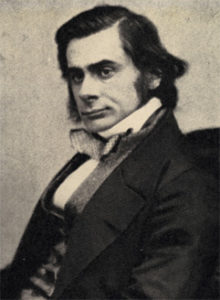“Agnostic.” The word first coined by Thomas Huxley in the 1860s was not the beginning of agnosticism. According to the Internet Encyclopedia of Philosophy Protagoras was one of the first to claim that he had “no means of knowing whether they [gods] exist or not…” However, it was Huxley who gave a face to the rarely-heard voice of agnosticism.
The simplest understanding of what an agnostic is come down to the claim that they don’t know. More specifically, the idea is that they don’t have any way to know that god/s exist.
Between a rock and a hard place.
Agnosticism is seen by many as a position between theism and atheism. Theists claim that there is a god or gods. Atheists claim that there is no god or gods. Agnostics – by modern definitions and understandings – claim that there is no way of truly knowing that there is a god. Many would see agnosticism as a fall-back position; one that is neither willing to commit to a god or the non-existence of a god.
 Agnostics find themselves in a precarious position, often looked down upon by both sides: the deists and atheists; though they are probably looked down upon less by deists than by atheists.
Agnostics find themselves in a precarious position, often looked down upon by both sides: the deists and atheists; though they are probably looked down upon less by deists than by atheists.
This is because agnostics have not completely ruled out of existence the theist’s god(s). For atheists, there is a frustration with agnostics for not being willing to make a commitment either way.
The real problem with how agnosticism is how it’s perceived in modern times. Thomas Huxley did not claim agnosticism as a religious concept. In many ways, Huxley’s idea of agnosticism was a scientific approach to god and religion. In his book, and Christian Tradition, page 246, Huxley said:
“In matters of the intellect, follow your reason as far as it will take you, without regard to any other consideration.”
And in the same paragraph:
“In matters of the intellect do not pretend that conclusions are certain which are not demonstrated or demonstrable.”
The scientific method is thus: Observe and describe, formulate a hypothesis to explain observations, predict outcomes based on hypothesis, test for outcomes predicted by the hypothesis, and then accept, modify or reject hypothesis based on the test results. This is truly a “follow your reason” and not accepting conclusions that “are not demonstrated or demonstrable.”
The way things are now.
The philosophical approach that Huxley laid out as a definition of what agnosticism is, is not what it has become. For many people who claim themselves agnostics, it has become a fall-back position, a non-commitment to a god or gods without fully abandoning belief. It has become an excuse for non-commitment.
In many ways, the modern agnostic is rolling the dice on Pascal’s Wager. Pascal’s Wager suggests that even if you can’t know god exists, isn’t it better to bet that he does. In this way, a person might eventually come to believe in god, or at the least, avoid eternal damnation. The fall-back position of agnosticism in modern times is a fail-safe or – at the least – a refusal to commit one’s soul to the game. Or, to give a sports analogy, it’s being a bench warmer with no intention of actually getting on the field and risk getting dirty.
Agnostics of the Huxley style.
There are some agnostics in the world that may truly hold to the original definition established by Huxley. A recent book, titled Envy: An Agnostic’s Quest, tries to re-establish the Huxley philosophy. By purporting to evaluate faith and god in a logical way, the author intends to give legitimacy to agnosticism as a logical fall-back position for people. Of course, this fails to keep in mind that the base of scientific knowledge in Huxley’s time was not as broad or as deep as it is now.
Our knowledge of the world and the universe that surrounds it, provides ample conclusions that demonstrate how life not only began but how it came to be. It is highly probable that Huxley would no longer consider himself an agnostic as he styled it, but rather, an atheist based on the scientific information gathered over the intervening decades since his proclamation.






